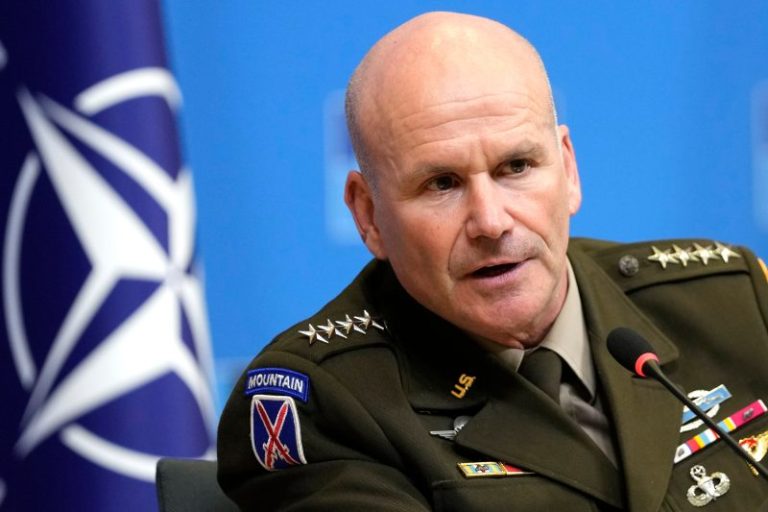The top U.S. general overseeing military operations in Europe warned lawmakers Wednesday that the war in Ukraine has reached a decisive moment, with Russia expected to hold a 10-1 advantage on artillery shells “within weeks” unless the United States approves additional military support for the government in Kyiv.
“The severity of this moment cannot be overstated,” Gen. Christopher Cavoli said while testifying before the House Armed Services Committee. Ukraine will run out of artillery shells and air-defense munitions without additional U.S. support, he said.
“The side that can’t shoot back loses,” said Cavoli, head of U.S. European Command. “The stakes are very high.”
The stark assessment came as House Speaker Mike Johnson (R-La.) has refused to hold a vote on a national security spending package that includes about $60 billion for Ukraine, $14 billion for Israel, and additional money for Pacific initiatives and other priorities.
The Senate passed a $95.3 billion bill in February, but Johnson has said he won’t consider that measure as fellow conservatives opposed to additional spending on Ukraine have threatened to end his speakership if he does. Instead, he has signaled an intent to introduce alternative legislation as soon as this month but has not said when it could be put to a vote.
Cavoli’s remarks were the latest by a senior U.S. official warning Congress that it must move on providing more aid to Ukraine if Russia’s battlefield advances are to be stopped. Others have said they foresee an array of grim possibilities if the aid is not approved, including the likelihood of massive Ukrainian casualties in the best-case scenario and a collapse of Ukrainian front lines in the worst.
Cavoli told lawmakers that Russia “represents a chronic threat” and has turned to China, North Korea, and Iran for support to challenge existing international norms while forming “interlocking strategic partnerships.” He called the issue “profoundly integral” to U.S. national security interests, and said that while European allies have made advances in bolstering their own security, U.S. leadership is required.
Celeste Wallander, a senior Pentagon official, appeared alongside Cavoli during the hearing and said that the Biden administration’s goal of delivering a strategic defeat to Russian President Vladimir Putin remains. China, she said, is watching how the United States behaves in meeting its commitments to allies and partners.
“We are doing this out of self-interests, out of American national security interests, as well as — of course — the admiration that we Americans feel for Ukraine,” Wallander said. “But in the end, we are doing this so that Americans can be secure at home and abroad.”
Lawmakers on Wednesday remained split on additional funding for Ukraine, though the measure is expected to pass the House with some Republican votes if it is brought for a vote.
Rep. Cory Mills (R-Fla.) said that while NATO was created to stop Russian expansionism, Germany, France and others in Europe have not paid their “dues” by meeting a commitment to NATO to spend 2 percent of their own gross domestic product on defense. Ukraine, meanwhile, has not presented a plan for how it will win the war, he said.
“We need to start thinking about three priorities for a change: America, Americans and American interests,” Mills said.
Rep. Michael Waltz (R-Fla.) also called out continued shortfalls in NATO allies’ spending on their own defense. It was “pathetic” that just 11 out of NATO’s then-30 member alliance met their commitments to spend 2 percent, he said. While that number soon will reach 20 of 32, he said, “the tyranny of low expectations” has infected national security discussions.
“You’re asking us to go to the American people again and again,” Waltz said of funding security in Europe. “We’ll be having this same conversation at this posture hearing … next year: ‘American people, dig deeper in your pockets because European politicians can’t and won’t get their people to dig deeper into their pockets.’ It’s a good deal for them. It’s a bad deal for the American people.”
Rep. Bill Keating (D-Mass.) countered, saying that while some Republicans have criticized President Biden and European nations for not doing more to help Ukraine, it is Johnson who is holding up the bipartisan effort to support Kyiv.
“General Cavoli, you termed this as ‘extremely serious.’ You said that the severity of this moment — this moment — cannot be overstated,” Keating said.
“We’ve heard the name ‘Biden’ again, and ‘Biden’ again, yet we’re here right now in this Congress with our responsibility and one person — one person! — is holding this up,” Keating said.
Rep. Elissa Slotkin (D-Mich.) said that Johnson has a choice to make, and she accepts that it may cost him the speakership. She noted that there is a petition on the House floor that would allow the aid package to pass with support with just a few Republicans.
“That’s what leadership is,” she said. “It’s the big-boy pants and making tough choices.”

